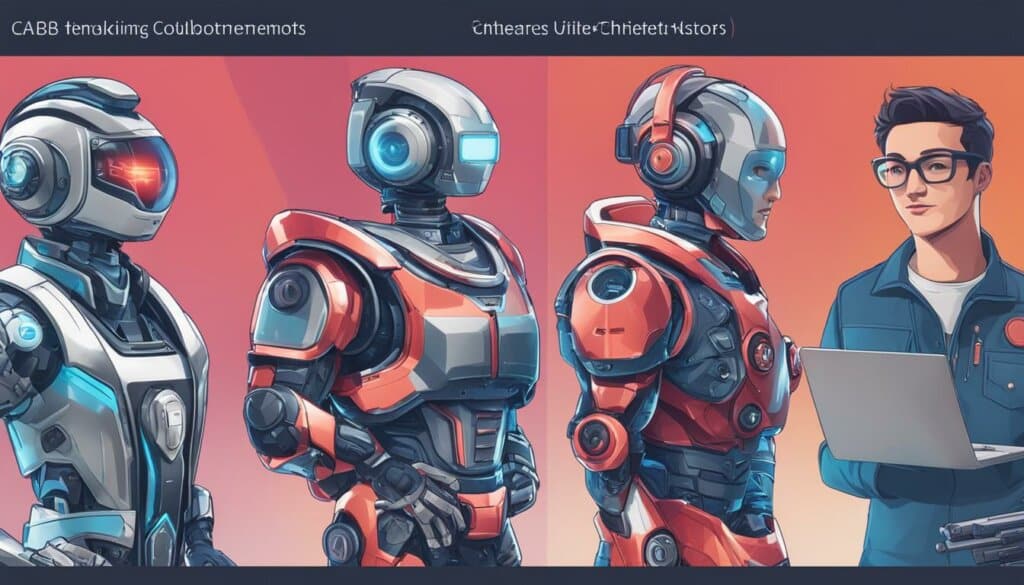Table of Contents
Chatbots are becoming increasingly popular in the business world. According to PwC’s annual report, chatbots are forecasted to grow at a rate of 20% annually and are expected to have a total investment of over $2.5 billion by 2022. They offer businesses the ability to reach and communicate with customers online in a more targeted and efficient manner compared to social media platforms.
Chatbots have a significant impact on improving customer engagement, optimizing sales, and enhancing the overall customer experience. With advanced chatbot technology and a variety of chatbot platforms available, businesses can provide personalized interactions, automate customer service, and streamline sales processes. The use of ai assistants enables businesses to engage with customers in real-time, answering inquiries promptly and offering tailored recommendations.
By incorporating chatbots into their online strategies, businesses can leverage the power of AI technology to create seamless and efficient customer experiences. Chatbots not only improve customer satisfaction but also increase operational efficiency and drive business growth. As the role of chatbots continues to grow, businesses that embrace this technology will have a competitive advantage in the online marketplace.
What are Chatbots and How They Work?
Chatbots are real-time communications channels that businesses use to interact with their customers. They function as virtual assistants, providing instant responses and engaging in conversations with users. From a user’s perspective, chatbots create a more conversational experience compared to traditional search engine interactions. They use search engine links to understand user queries but also consider other parts of the conversation to provide relevant and context-based responses.
Chatbots leverage conversational AI technology to simulate human-like conversations and provide automated responses. They are designed to understand natural language and can handle various types of user inputs, including text, voice, and even images. By analyzing the user’s intent, ai assistants can offer personalized recommendations, answer questions, and perform specific tasks.
Chatbots rely on machine learning algorithms to continuously improve their performance. They learn from past interactions and user feedback, allowing them to adapt and provide more accurate and helpful responses over time. This iterative learning process enables chatbots to become more intelligent and efficient in delivering a seamless and engaging user experience.
| Types of Chatbots | Main Features |
|---|---|
| Rule-Based Chatbots | Follow predefined rules to provide specific responses |
| AI-Powered Chatbots | Utilize machine learning algorithms to understand and respond to user queries |
| Virtual Assistant Chatbots | Perform tasks and provide assistance similar to human assistants |
Chatbots are revolutionizing the way businesses communicate with their customers. By leveraging real-time communications and conversational AI, ai assistants offer a more personalized and interactive customer experience. They enable businesses to provide instant support, gather valuable insights, and streamline customer interactions. As chatbot technology continues to advance, we can expect even more sophisticated and intelligent ai assistants in the future.
Why chatbots in digital marketing?
Chatbots play a crucial role in digital marketing by facilitating automated customer service and enhancing the overall customer experience. With the increasing demand for instant responses and personalized interactions, businesses are turning to chatbot technology to meet these expectations. By utilizing chatbots, businesses can effectively manage and handle multiple conversations simultaneously, allowing for faster response times and improved efficiency.
One of the main benefits of chatbots in digital marketing is their ability to provide automated customer service. AI assistants can handle a wide range of common customer inquiries and provide instant responses, reducing the workload on human customer support agents. This not only ensures fast and efficient customer service but also helps businesses save time and resources.
Furthermore, AI assistants have the potential to optimize sales by providing personalized recommendations and product suggestions based on user preferences and previous interactions. By analyzing user data and behavior, chatbots can offer tailored suggestions that are more likely to convert into sales. This level of personalization helps businesses increase their conversion rates and drive revenue.
In addition to automated customer service and personalized recommendations, AI assistants also enhance the overall customer experience. They offer a seamless and interactive communication channel, allowing users to engage with brands in a more conversational manner. This not only improves customer satisfaction but also strengthens brand loyalty and engagement.
Benefits of chatbots in digital marketing:
- Automated customer service
- Personalized recommendations
- Optimized sales process
- Enhanced customer experience

By leveraging chatbot technology, businesses can provide innovative and seamless experiences to their customers. With their ability to automate customer service, provide personalized recommendations, and enhance the overall customer experience, AI assistants have become invaluable tools in the world of digital marketing.
How to Create a Chatbot
Creating a chatbot is a straightforward process that can be accomplished using various chatbot platforms and marketing tools available in the market. These tools provide businesses with the necessary resources to build and launch their chatbot accounts, enabling them to engage with customers in a more interactive manner. Popular chatbot platforms such as Chatfuel, ManyChat, and MobileMonkey offer user-friendly interfaces and drag-and-drop functionality to simplify the chatbot creation process.
When building a chatbot, it’s important to consider the specific goals and objectives of the business. This involves understanding the target audience and tailoring the chatbot to meet their needs. Customization options typically include adding relevant keywords, designing conversational flows, and integrating the chatbot with messaging apps like Facebook Messenger or Skype.
It’s worth noting that building an effective chatbot model requires careful planning and continuous improvement. This involves monitoring the chatbot’s performance, analyzing user interactions, and making necessary adjustments to ensure that the chatbot is providing valuable and relevant information to users.
Overall, with the availability of chatbot platforms and marketing tools, businesses of all sizes can easily create and deploy chatbots to enhance their customer engagement and streamline their operations.
Table: Comparison of Popular Chatbot Platforms
| Chatbot Platform | Key Features | Integration Capabilities | Pricing |
|---|---|---|---|
| Chatfuel | Easy-to-use interface, AI-powered, rich messaging, broadcasting | Facebook Messenger | Free plan available, premium plans start at £15/month |
| ManyChat | Visual bot builder, AI-powered, broadcasting, e-commerce integration | Facebook Messenger, SMS | Free plan available, premium plans start at £10/month |
| MobileMonkey | OmniChat platform, multichannel, AI-powered, chatbot analytics | Facebook Messenger, SMS, web chat, WhatsApp | Free plan available, premium plans start at £14/month |
Types of Chatbots
Chatbots come in various types and forms, each with its own set of features and capabilities. Understanding the different types of chatbots can help businesses choose the most suitable option for their specific needs.
Agent Chatbots
Agent chatbots are simple chatbots that can interact with users, make or receive calls, send SMS messages, and provide responses in natural language. These chatbots are designed to mimic human customer service representatives and are often used in customer support roles. They can handle basic queries, provide information, and resolve simple issues, thus freeing up human agents to handle more complex tasks.
Visual Chatbots
Visual chatbots display text-based responses instead of using traditional chat interfaces. They are often used for providing support and assistance to users. Visual chatbots use visual cues, such as buttons and menus, to guide users through the conversation and provide relevant information. These chatbots are particularly effective in scenarios where users need step-by-step instructions or visual demonstrations.
Chatbot Techniques
Chatbot techniques refer to the underlying technology and algorithms that power chatbot interactions. There are several techniques used in chatbot development, including rule-based systems, machine learning, and natural language processing (NLP). Rule-based systems involve creating predefined rules and responses for the chatbot to follow. Machine learning techniques enable chatbots to learn and improve their responses based on past interactions. NLP allows chatbots to understand and interpret user queries, enabling more accurate and context-aware responses.

Creating a Chatbot Using RapidFire Bot Builder
RapidFire bot builder is an innovative tool that allows businesses to create AI assistants with personalized responses, turning them into brand ambassadors and increasing the online conversion rate. With this powerful platform, businesses can automate and streamline their customer interactions, leading to improved customer satisfaction and increased sales.
Personalized responses are crucial for creating a positive customer experience. RapidFire bot builder empowers businesses to tailor their AI assistants to reflect their brand’s identity and values. By customizing the chatbot’s language, tone, and style, businesses can create a seamless and engaging experience that resonates with their target audience.
| Benefits of Using RapidFire Bot Builder | How It Enhances Customer Interactions |
|---|---|
| 1. Personalized responses | – Chatbots can provide customized information and recommendations based on user preferences, increasing the chances of conversions. |
| 2. Brand ambassador | – Chatbots act as the face of the brand, representing its values and offering consistent and reliable support to customers. |
| 3. Increased conversion rate | – With personalized responses and a seamless user experience, chatbots can significantly improve the conversion rate for online businesses. |
Implementing RapidFire bot builder enables businesses to create chatbots that provide instant and accurate responses to customer queries. By automating customer interactions, businesses can save time and resources, allowing their teams to focus on more complex tasks and strategic initiatives. The result is a more efficient and productive customer service process that drives customer satisfaction and loyalty.

Key Takeaways
- RapidFire bot builder is a powerful tool for creating chatbots with personalized responses.
- Chatbots created using this platform act as brand ambassadors, representing the business and enhancing the online conversion rate.
- With RapidFire bot builder, businesses can automate and streamline customer interactions, leading to improved efficiency and customer satisfaction.
- Personalized responses and a seamless user experience are the key factors in driving conversions and building customer loyalty.
What You Need to Know Before Building a Chatbot
Before embarking on the journey of building a chatbot for your business, it’s important to understand the various benefits it can bring. One key advantage is the ability to engage in interactive conversations with your audience. Unlike traditional customer service channels, AI assistants allow users to ask questions and receive instant responses, creating a more personalized experience. This can lead to improved customer satisfaction and increased customer loyalty.
Business Feedback and Customer Queries
Chatbots also provide businesses with valuable feedback and insights from customers. Through conversations with AI assistants, businesses can gather information about customer preferences, pain points, and expectations. This data can be used to improve products and services, enhance marketing strategies, and make informed business decisions. Furthermore, chatbots can handle a wide range of customer queries, reducing the workload on businesses and ensuring fast and efficient responses.
Another advantage of chatbots is their ability to streamline customer support. By automating repetitive tasks and providing instant responses, chatbots can significantly reduce response times and improve efficiency. This allows businesses to provide round-the-clock customer support without the need for additional manpower. Chatbots can also handle multiple conversations simultaneously, ensuring that no customer query goes unanswered.
Overall, building a chatbot for your business can offer a range of benefits, from improved customer engagement to enhanced customer experiences. By leveraging the power of chatbot technology, businesses can gather valuable insights, streamline customer support, and provide personalized experiences to their customers. However, it’s crucial to carefully plan and design your chatbot to ensure it aligns with your business goals and provides a seamless and engaging experience for users.
Successful Examples of Chatbots In Digital Marketing
Chatbots have revolutionized the way businesses interact with customers in the digital marketing landscape. One successful example of chatbot integration is through Facebook advertising. By leveraging chatbots in their Messenger tool, businesses can engage in real-time conversations with customers and provide personalized experiences. This allows companies to deliver targeted advertisements, answer customer queries, and offer product recommendations, all within the familiar Facebook platform.
Another area where chatbots excel is in customer interaction. These AI-powered tools can handle a wide range of customer queries and provide instant responses, improving response times and overall customer satisfaction. Chatbots can assist with tasks such as order tracking, providing product information, and offering support, ensuring that businesses address customer needs promptly and efficiently.
Furthermore, chatbots have proven to be more than just a technological tool; they are also job creators. While AI is expected to make many jobs redundant, chatbots have emerged as a key driver of job creation in the industry. As businesses adopt chatbot technology, there is an increased demand for professionals who can design, develop, and manage chatbot systems. This translates into new opportunities for individuals skilled in AI and chatbot development.
Table: Successful Chatbot Examples in Digital Marketing
| Industry | Use Case |
|---|---|
| Banking | Chatbots provide personalized financial advice, process transactions, and deliver updates on account balances. |
| Travel | Chatbots assist with flight bookings, hotel reservations, and provide travel recommendations based on user preferences. |
| Retail | Chatbots enhance the shopping experience by suggesting products, answering product-related questions, and facilitating purchases. |
These are just a few examples of how chatbots have successfully been integrated into digital marketing strategies. As AI technology continues to advance, chatbots are poised to play an even larger role in helping businesses streamline operations, improve customer interactions, and drive revenue growth.
Conclusion
Chatbots are revolutionizing online businesses by leveraging AI technology to enhance customer engagement, streamline sales processes, and improve customer service. These virtual assistants offer personalized experiences, handle multiple conversations simultaneously, and provide valuable insights from customer interactions. With a forecasted growth rate of 20% annually and a projected investment of over $2.5 billion by 2022, chatbots are becoming increasingly prevalent in the online marketplace.
By implementing chatbots, businesses can optimize their customer experience, efficiently manage customer queries, and gather valuable feedback. The conversational nature of AI assistants creates a more engaging and personalized interaction, providing users with a seamless and convenient experience. With their ability to handle a large volume of conversations and provide consistent and precise responses, chatbots help businesses save time and resources.
Furthermore, chatbots play a vital role in digital marketing by automating customer service, generating leads, and assisting with sales optimization. Successful examples, such as those used in Facebook advertising and customer support, have demonstrated the effectiveness of chatbots in increasing customer interaction and driving business growth. As the world embraces AI technology, AI assistants are set to become a fundamental tool for businesses across various industries.
In conclusion, chatbots are transforming online businesses, offering a new level of customer engagement and streamlining processes. With their capabilities to provide personalized experiences, handle multiple conversations, and gather valuable insights, chatbots are an invaluable asset to businesses in the digital age.
Source Links







